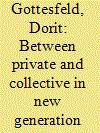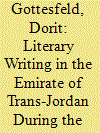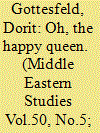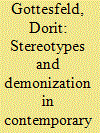|
|
|
Sort Order |
|
|
|
Items / Page
|
|
|
|
|
|
|
| Srl | Item |
| 1 |
ID:
158075


|
|
|
|
|
| Summary/Abstract |
The article examines new generation Palestinian writing in the West Bank, focusing on the ongoing tension between the private and the collective dimensions in literary works there. The works of Palestinian writer of Ramallah, Akram Musallam (b. 1971), serve as test case. The article shows that Musallam's novels preserve a connection to the Palestinian problem and the national-political life on one hand, and create meanings beyond time and place limited by this connection, on the other. The tension between the private and the collective is not only well reflected in Musallam's writings, but in fact constitutes their main pivot and it is embodied in an original and unique inner thematic and stylistic struggle within his writings. Musallam's works serve as an example of the fact that despite recent trends to forsake the collective and focus on the private, Palestinian literature almost always relates, either directly or indirectly, either through creative or less creative means, to collective Palestinian issues.
|
|
|
|
|
|
|
|
|
|
|
|
|
|
|
|
| 2 |
ID:
188649


|
|
|
|
|
| Summary/Abstract |
This article deals with the literature that flourished in Jordan during the reign of King Abdullah I. It shows that although Abdullah wanted his views and the values of his regime to prevail over literary writing, behind the scenes, an opposition literature grew that undermined these values. Oppositional messages were disguised using various artistic means and many works were published outside rather than inside Jordan. In the end, however, it seems that the regime still managed to impose its values, since up to the present, literary research has tended to ignore the works written during this early period, showing that writing in Trans-Jordan was not oppositional. This article fills this void by pointing to the buds of subversion as reflected in literature written at that time.
|
|
|
|
|
|
|
|
|
|
|
|
|
|
|
|
| 3 |
ID:
133527


|
|
|
|
|
| Publication |
2014.
|
| Summary/Abstract |
This article examines the writing of ?uz?mah ?ab?yib, a new generation Palestinian writer, who is considered one of the foremost Palestinian women writers. It focuses on her novel Qabl an tan?m al-malikah, which serves as an example of the bold and dissident writing of the new generation of Palestinian women writers. The article examines the way in which ?ab?yib creates a feminization of humour and a kind of a 'feminine humour'. ?ab?yib employs humour in order to shed light on the darkness of life and show how despite everything and in spite of an arduous and troubled life, women know how to enjoy the small and everyday things in life.
|
|
|
|
|
|
|
|
|
|
|
|
|
|
|
|
| 4 |
ID:
178539


|
|
|
|
|
| Summary/Abstract |
This article examines the way in which the Israeli-Palestinian conflict, Israel and the Israelis are reflected in contemporary Palestinian writing in Jordan, taking the work of Nablus-born Jordanian author Samia ʿAtʿut as a case study. The article shows how, on the one hand, ʿAtʿut uses literary writing as a tool to reflect the mood of the people in relation to the Palestinian issue. On the other hand, through writing full of obscurity, sophistry and deception, and by the incorporation of political-national texts within collections of stories dealing mainly with social issues, ʿAtʿut manages to prevent her writing from being perceived as ideological, and transforms her work into texts that carry a deep and universal social message. The article shows that the Israel-Jordan peace agreement, the Jordanian establishment’s changing attitudes toward Israel, the contemporary trends of ‘personal’ literary writing, and the attempt to understand the ‘other’ that exists in the literary works of other contemporary female writers – all fail to overcome the writer’s abrasive opinions, which she expresses in seemingly ideological writing.
|
|
|
|
|
|
|
|
|
|
|
|
|
|
|
|
|
|
|
|
|